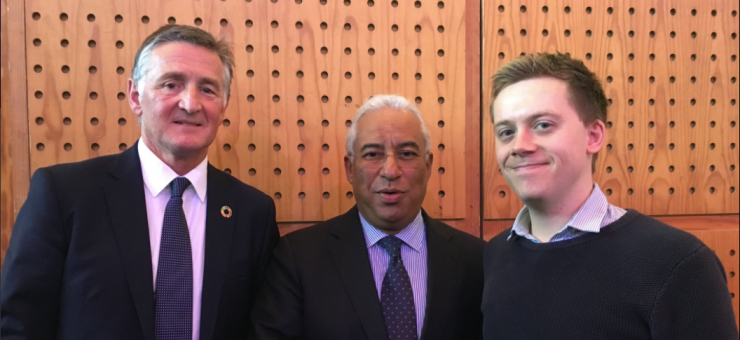UNI GS brings message of sustainable and democratic globalisation to the Web Summit in Lisbon

UNI Global Union General Secretary Philip Jennings brought the union message of sustainable, responsible and democratic globalisation to the world's largest tech conference, the Web Summit in Lisbon. Over 60,000 people from more than 150 countries packed the Conference to discuss the issues facing an increasingly interconnected world. On a panel featuring the Portuguese Prime Minister Antonio Costa, former Greek Prime Minister George Papandreou and Guardian journalist Owen Jones, Jennings debated whether globalisation was doomed to benefit only the richest of the rich, or whether it was possible to rethink traditional globalisation.
Owen Jones, who moderated the discussion, opened the session saying, “This is one of the great topics of our times. Can globalization work for the many not the few? The 8 richest men on the earth own the same as the bottom half combined. In Europe, since the financial crash, we have seen devastating cuts to public services and a reversal of labour rights, all whilst slashing taxes for the top earners.”
Representing UNI’s 20 million workers around the world, Jennings emphatically responded to the question saying, “The answer is a massive yes – there are alternatives to the savage globalisation we have experienced. We just need the guts to present our alternative vision and the political will to mobilise people.”
“Financialisation has failed. Neo-liberalism has failed. Working people have suffered from the closing of democratic spaces and workers have been subjected to economic and political violence.”
“We have to create 600 million jobs in the next 12 years just to keep global unemployment at the same level. We need to find a new way, we need to change the narrative – this model of globalisation has not worked. Globalisation, in its current form, has created a global elite with unprecedented power.”
“After sustained pressure from the labour movement and others, we are starting to see that even the G20 said in their summit this year that they would “leave no-one behind” and declared that competition in this global economy should not be based on a race to the bottom and the abuse of workers’ rights.”
“The UN has adopted sustainable development goals in an attempt to put the global economy on a new path. These goals call for the elimination of child labour by 2025 and to eliminate extreme poverty by 2030. Lofty goals, but we need to see action on the ground ina time when we must change the distribution of power. The share of wages in the wealth produced has collapsed and in-work poverty rages.”
“However, there are solutions, there are alternatives. It’s time to change course for a sustainable, democratic and humane globalisation – together we can make it happen.”
Prime Minister Antonio Costa of Portugal said, “Globalisation has two faces. On the one hand it has contributed to real reduction in poverty in many countries. We have emerging countries, for example in China millions of people have come out of poverty. On the other, it has increased inequality and middle classes in many developed countries have suffered. Globalisation has not worked for everybody.”
“It is necessary to find global responses to global issues. We face issues such as climate change which need to be tackled through cooperation. Competition cannot be a race to the bottom – we need strong labour rights, strong environmental regulations and a fairer distribution of wealth to redress the situation.”
Former Greek Prime Minister George Papandreou said, “Capital has left the nation state and its obligations to our societies. This creates a rat-race where companies exploit places with cheaper labour, low environmental regulations and no collective labour regulations or human rights.”
“We have lost the social contract. Our great challenge is to regain that democratic social contract. We need to see a different type of globalization based on humanity, democracy, equity and the protection of human rights.”

